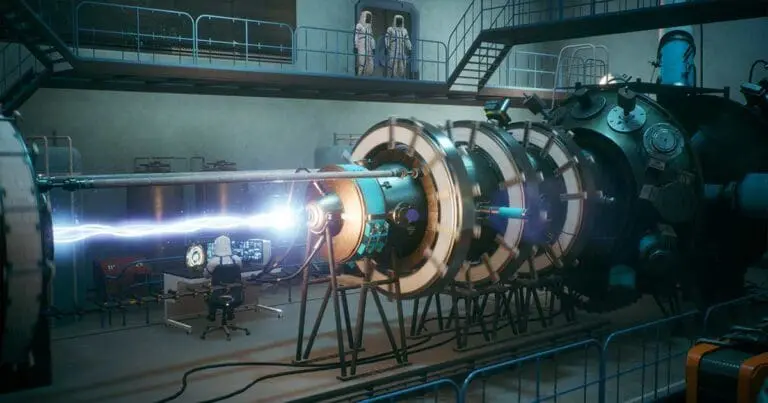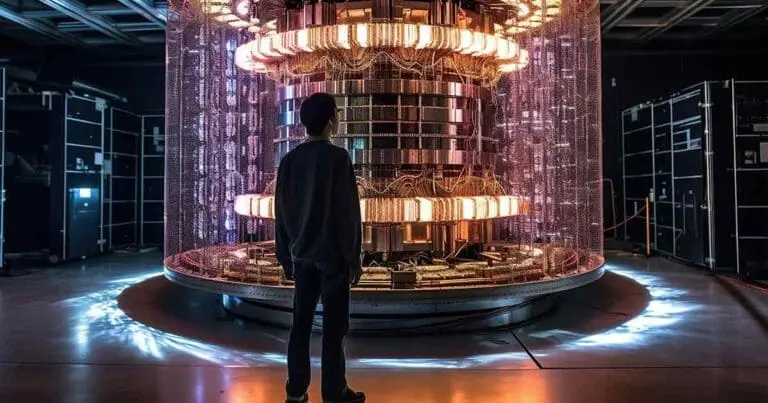Energy Evolution: How Nuclear Fusion Could Shape the Job Market

Energy Evolution: How Nuclear Fusion Could Shape Future Careers
In a world grappling with the consequences of climate change and the depletion of fossil fuels, the pursuit of clean and sustainable energy sources has become more pressing than ever.
Nuclear fusion is at the forefront of this energy revolution, a once fantastical concept that is quickly transitioning from the pages of science fiction into reality.
As we peel back the layers of innovation, venture capital investments, and breakthroughs driving the rise of nuclear fusion, we begin to see the profound implications this revolutionary technology could someday have on the job market and the emergence of exciting new careers that could potentially shape the future of clean energy.
Nuclear fusion and the job market:
- What is nuclear fusion?
- The potential of nuclear fusion and clean energy
- Nuclear fusion implications for the job market
- New jobs being created by nuclear fusion innovation
What is nuclear fusion?
Nuclear fusion is a clean energy source that promises virtually limitless, non-polluting, and sustainable power by combining light atomic nuclei to form heavier ones — a phenomenon that releases immense energy, much like the one powering our sun.
Unlike fossil fuels, fusion does not emit harmful by-products or greenhouse gases, and it utilizes abundant elements like hydrogen and lithium, making it a highly desirable solution for future energy needs.
The potential of nuclear fusion and clean energy
Among the areas of potential of nuclear fusion and clean energy are limitless clean energy, sustainable energy, venture capital, Silicon Valley involvement, and big name investor involvement.
The uphill battle of nuclear fusion
Despite noteworthy achievements, such as attaining net energy gain under controlled laboratory conditions, the commercial implementation of fusion power remains an aspiration, hindered by substantial scientific and financial obstacles.
Essentially, while the technology is in a phase of extensive experimentation and refinement, it has not yet reached the stage of practical, ubiquitous energy production.
Nuclear fusion can provide limitless clean energy
The concept of nuclear fusion, essentially the same process that fuels the sun, presents a formidable solution to the world’s energy crisis.
Unlike traditional energy sources, the process emits no greenhouse gases and uses readily available elements, offering a sustainable and eco-friendly energy future.
Nuclear fusion as a sustainable energy solution
The achievement of “net energy gain” in recent experiments signifies a pivotal milestone in the realm of nuclear fusion.
It means the fusion process now produces more energy than it consumes — a previously elusive goal.
This advancement is critical as it marks the feasibility of fusion as a practical and boundless source of energy, edging us one step closer to a sustainable energy future.
Venture capital in nuclear fusion
Venture capital is increasingly flowing into nuclear fusion, signaling its potential as a lucrative and transformative industry.
High-profile investors are funding startups focused on harnessing fusion energy, drawn by its promise of boundless clean power.
This influx of capital also drives job creation, from research scientists and engineers to project managers and technicians in these startups.
Silicon Valley and nuclear fusion
Silicon Valley, known for its technological advancements and innovative startups, is increasingly becoming a nuclear fusion research and development hub.
Several promising ventures in this area have emerged from the tech capital, attracting talent and investment.
These developments signify the burgeoning role of nuclear fusion within the tech sector and its potential to shape the job market in the future.
Investors committing to nuclear fusion and clean energy
Notable investors such as Sam Altman, Peter Thiel, and Dustin Moskovitz have recognized the potential of nuclear fusion and are redirecting resources toward this burgeoning sector.
Sam Altman, in particular, is investing in Helion Energy, a promising startup focused on developing fusion energy.
The involvement of these influential figures underscores the growing interest in nuclear fusion and its potential impact on the future of clean energy.
Nuclear fusion implications for the job market
- New job opportunities
- Emerging roles
- Specialized training
- Long-term job market impact
- Staffing agencies bridging the gap
New job opportunities in nuclear fusion
While the timeframe for practical implementation of nuclear fusion remains to be seen, its advent presents a wide variety of new job opportunities across different sectors, including research and development, construction and maintenance, and policy and regulatory affairs.
In the research and development sector, there is a growing demand for nuclear physicists, engineers, and technicians to drive the development and optimization of fusion technology.
Meanwhile, the construction sector could see a surge in employment as new fusion power plants are built, and roles in policy-making and regulatory bodies would become increasingly important to navigate the ethical, safety, and legal aspects of this new energy source.
Emerging roles in nuclear fusion
Specialized roles in the field of nuclear fusion, particularly in research, engineering, and plant operations, could witness a surge in demand as this innovative technology evolves.
Research roles, especially those relating to nuclear physics and fusion technology, would be crucial in advancing this field, requiring a unique blend of theoretical knowledge and practical expertise.
Simultaneously, engineering and plant operations roles would be vital in translating research breakthroughs into operational fusion power plants, demanding skills in systems engineering, plant operations, and an understanding of fusion technology.
Specialized training for nuclear fusion
There is a parallel need for specialized training programs to support the growing need for specialized roles in nuclear fusion.
These programs would focus on equipping individuals with the unique skill sets required in the field, such as nuclear physics, systems engineering, and plant operation.
By fostering this targeted learning, we are nurturing the talent necessary for the nuclear fusion industry and encouraging the growth of a workforce capable of leading the charge toward a sustainable energy future.
Long-term job market impact
The long-term impact of nuclear fusion on the job market extends beyond simply creating new roles.
It has the potential to revolutionize industries, fostering innovation and developing new sectors and opportunities.
Furthermore, the global push towards sustainability is likely to see nuclear fusion jobs becoming highly sought after, driving a significant shift in the job market landscape.
Staffing agencies bridging the gap
Staffing agencies specializing in the technology sector will play a key role in bridging the skills gap in the nuclear fusion industry.
They will connect qualified professionals with the burgeoning field and aid companies in sourcing the right talent.
Furthermore, their role in providing career guidance will be instrumental in molding a competent and efficient workforce for this future-forward industry.
Potential new nuclear fusion jobs
Potential new nuclear fusion jobs include fusion physicists, fusion engineers, fusion plant technicians, fusion policy analysts, fusion energy consultants, plasma physicists, and health physics technicians.
Fusion Physicist
Fusion physicists work to understand and improve upon the mechanics of nuclear fusion using theoretical and experimental research methods.
They are responsible for designing and conducting experiments, analyzing data, and developing new technologies to push the boundaries of fusion energy.
Fusion Engineer
Fusion engineers use their technical expertise to design, build, and maintain fusion reactors.
They work on everything from the power plant’s systems and components to its controls and instrumentation, ensuring that it operates safely and efficiently.
Fusion Plant Technician
Fusion plant technicians play a crucial role in the day-to-day operations of fusion energy plants.
They are responsible for maintaining equipment, troubleshooting issues, and implementing safety protocols to ensure smooth functioning of the facility.
Fusion Policy Analyst
Fusion policy analysts keep a pulse on regulations and policies surrounding fusion energy and its potential impact.
They assess this innovative technology’s ethical, legal, and safety considerations and work closely with policymakers to develop effective laws and guidelines for its implementation.
Fusion Energy Consultant
As fusion energy continues to emerge as a viable energy source, businesses and organizations will turn to fusion energy consultants for guidance on how to incorporate this technology into their operations.
These experts provide strategic advice on the best approach to implementing fusion energy, considering cost, efficiency, and sustainability factors.
Plasma Physicist
Plasma physicists play a pivotal role in advancing nuclear fusion technology, studying the behavior of plasmas – the hot, ionized gases necessary for initiating fusion reactions.
Their work involves conducting experiments to understand plasma properties, designing plasma confinement systems, and contributing to the development of fusion reactors.
Health Physics Technicians
Health Physics Technicians are tasked with ensuring safety protocols in fusion energy plants, particularly in relation to radiological safety.
They monitor radiation levels, implement safety measures, and conduct routine inspections to ensure the health and safety of the workforce in these facilities.
The future of energy employment
The future of energy employment will be largely driven by nuclear fusion in the global job market, fusion plant development, institutional strategies for change, and the role staffing agencies will play.
Nuclear fusion in the global job market
Nuclear fusion, if harnessed successfully, could significantly alter the energy sector, replacing fossil fuels with a near-limitless, clean source of power.
This could stimulate a profound transformation in the global job market, not only creating new roles in fusion technology development and management, but also reshaping existing industries as they adapt to this innovative energy source.
Moreover, the demand for specialized training and education in the field could increase, leading to job growth in academic and training sectors.
Nuclear fusion plant development
Recent breakthroughs in nuclear fusion have brought us closer than ever to achieving this revolutionary energy source.
The U.S. National Ignition Facility, for example, has recently reported a significant milestone by achieving a high-yield fusion reaction, a long-sought goal in the field.
In addition, the U.S. Department of Energy’s commitment to this promising technology is demonstrated by its recent allocation of $46 million in funding for the development of nuclear fusion plants.
Institutional strategies for change
Businesses should start preparing for a fusion-powered future by investing in research and development of fusion technology, partnering with staffing agencies to identify required skill sets, and offering internships to students in relevant fields.
Educational institutions, on their part, should consider incorporating specialized courses in nuclear fusion into their curriculum, while also fostering partnerships with fusion energy companies for practical exposure.
Additionally, they could establish scholarships and funding opportunities to attract and support students who wish to pursue careers in this emerging field.
The role of staffing agencies
Staffing agencies hold a pivotal role in bridging the talent gap for the emerging nuclear fusion industry.
They possess the capability to connect skilled professionals with companies investing in fusion technology, ensuring the right talent find their place in this innovative field.
Moreover, by offering career guidance, these agencies can help mold a future-ready workforce that can effectively navigate the intricacies of this industry.
Navigating the future of nuclear fusion
The rise of nuclear fusion presents an unprecedented opportunity to revolutionize clean energy and create a wave of new jobs.
This emerging technology, which promises near-limitless, clean power, could reshape not only the energy sector but also the global job market, necessitating new roles and skill sets.
It is crucial for employers, educators, and job seekers to proactively embrace this change.
For employers seeking talent and professionals looking for opportunities in nuclear fusion development, we invite you to connect with us.
Stay abreast of the latest developments in nuclear fusion and related career opportunities, and help to power a sustainable, fusion-fueled future.
Looking to hire top-tier Tech, Digital Marketing, or Creative Talent? We can help.
Every year, Mondo helps to fill over 2,000 open positions nationwide.
More articles about hiring and industry trends:
- The Future of Clinical Trials: AI-Powered “Synthetic Patients”
- The Age of Gen Z Workforce: The Great Negotiation
- Addressing FOBO (Fear of Being Obsolete) in the Age of AI
- Specialized AI Bots and the Evolution Beyond ChatGPT
- 24 Top In-Demand Tech and IT Jobs to Hire in 2024, with Salaries
- Fractional Executives & C-Suite Gig Work Shaping the Employment Landscape
- Harnessing the Power of Climate Tech to Drive Environmental Sustainability
- Staffing Strategies For Each Phase of the Business Cycle
- How to Leverage Tech and Digital Marketing for Back-of-House Hospitality
- Tapping the Gig Economy: When It Makes Sense to Hire Contractors
- What to Do When You Have Urgent Hiring Needs
- Generative AI & Its Impact on the Job Market: It’s Not All Bad News
- How to Recruit Top Data Scientists in a Competitive Job Market
- Lessons From Unicorn Companies: Hiring Strategies for Rapid Growth



